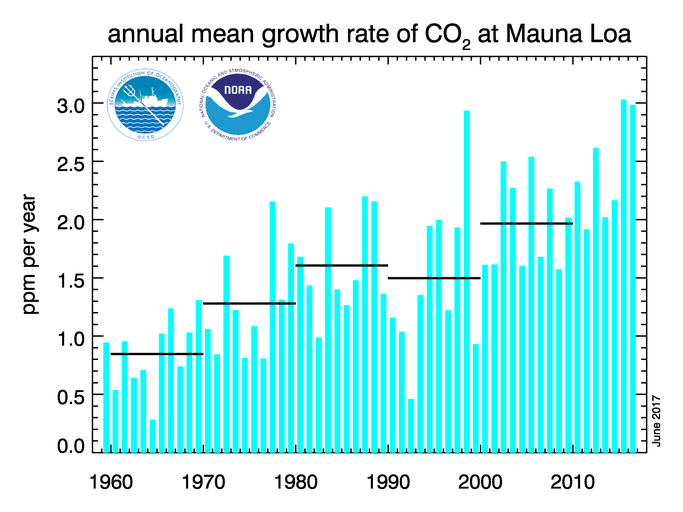Reducing Fossil Fuel Emissions Isn't Stopping CO2 Rise

Over the past few years, many nations have made a strong effort to reduce the amount of carbon dioxide they emit into the atmosphere. By replacing fossil fuel plants with renewable energy sources, we may have succeeded in starting to reduce our greenhouse gas emissions starting in 2017. This is a huge accomplishment.
But new research says that might not be enough. The amount of CO2 in our atmosphere is increasing anyway.
Our greenhouse gas emissions have been rising since we began burning fossil fuels centuries ago, but over the past few years that rate has been decreasing. In 2015 and 2016, the amount of CO2 we've pumped into the atmosphere has remained nearly unchanged from 2014 levels.
If the amount of CO2 we've been putting into the atmosphere each year is leveling out, then the total amount of CO2 should be stabilizing as well. Yet, according to recent data from NOAA, the total CO2 in the air is increasing at a record pace. Far from slowing down, the Earth's carbon dioxide crisis appears to be speeding up.

It's tough to say why this is happening. Some scientists are blaming the recent El Nino, which has been especially strong over the past two years. But the El Nino ended in early 2016, and shouldn't still be affecting the climate more than a year later.
A likelier-but more troubling-hypothesis is that there's nowhere left for the CO2 to go. The Earth has a number of carbon sinks, where carbon can be absorbed out of the atmosphere. The two largest are the oceans and the land plants, which absorb about 25 percent of CO2 emissions each. But these large carbon sinks might be growing saturated.
If these carbon sinks are absorbing less carbon, that could be terrible news for the planet. It would mean we'd have to work faster to develop artificial carbon capture technologies, which are mostly theoretical at this point. It might also mean we could experience more severe climate change effects than scientists have predicted.
There's still no definitive proof that the planet's carbon sinks are slowing down, but there's little else that would explain the dramatic increase in atmospheric CO2 over the past few years. One thing is clear: we're rapidly approaching a cliff, and that cliff may be much closer than we thought.
Source: The New York Times
You Might Also Like

